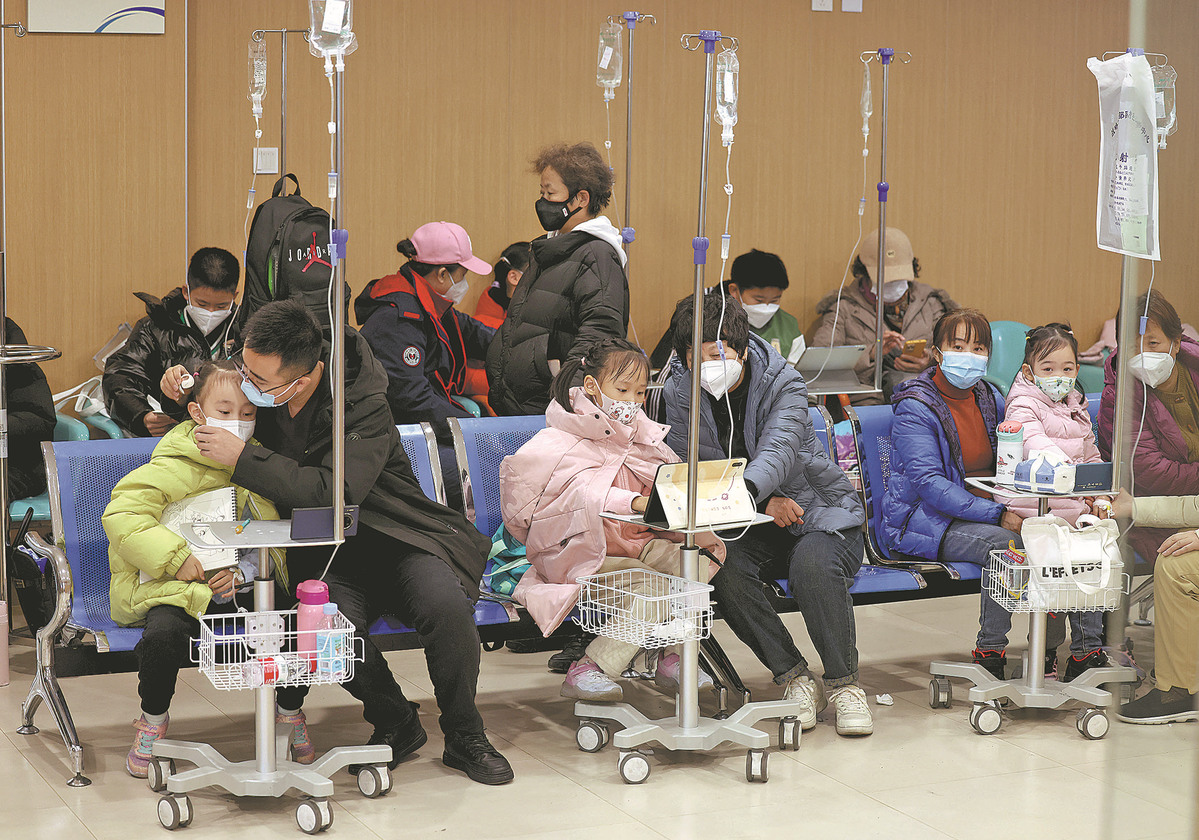Surge in sick kids sparks call for resources


Health authority forbids grassroots clinics from turning away patients
China's top health authority on Monday required localities to "exhaust all means" to increase pediatric service capacity and stock up on pediatric medications and relevant medical materials to cope with a spike in respiratory illnesses among children.
All grassroots medical institutions should be open to child patients and are forbidden from turning them away, the general office of the National Health Commission said in a circular released on its website.
"Community healthcare centers in cities seeing surging demand should also extend hours on weekdays by one to three hours or set up additional service periods on weekends based on their capability," said the commission.
Rural and community health centers should be guided to set up separate sections for pediatric services, and they should organize general physicians who have received training on pediatric diseases to see child patients.
Each community or village healthcare center should be paired with a pediatric department at a higher-level hospital. Experienced medical professionals will be allocated to grassroots facilities to provide pediatric services and train staff on key skills, including emergency care, prompt identification of severe symptoms and venipuncture — the process of inserting a needle into a child's vein.
Localities are also required to equip grassroots facilities with thermometers, nebulizers, antibiotics, antivirals, as well as pediatric medicines for easing cough and phlegm.
These requirements have been raised as China is battling a surge in respiratory illness fueled by the circulation of different pathogens including influenza, the COVID-19 disease and mycoplasma pneumoniae.
Children have appeared to be affected particularly hard this winter as parents have found difficulties obtaining hospital appointments or have to endure long waiting periods at major pediatric hospitals. Despite authorities' appeal to the public to visit primary health institutions first rather than going straight to large hospitals, concerns have emerged over the community clinics' capability and capacity in handling pediatric patients.
Wang Huaqing, chief immunization planning expert at the Chinese Center for Disease Control and Prevention, said late last month that influenza and rhinovirus are the most prevalent among toddlers aged 1 to 4, and for children aged 5 to 14, influenza, mycoplasma pneumonia and adenovirus are the most common.
Tong Zhaohui, vice-president of the Beijing Chaoyang Hospital affiliated to Capital Medical University, suggested a child who begins developing a fever to visit a community hospital to first take a rapid antigen test, which can identify whether they contracted a respiratory virus or a bacterial infection like mycoplasma pneumonia. They can also get regular antivirals and drugs there.
"However, for kids who have had a fever for more than three days or have shortness of breath, they should visit pediatric hospitals," he said during an interview with China Central Television on Sunday evening.
Tong added that most doctors at primary health institutions are trained in general medicine and are capable of dealing with common respiratory illnesses in children.
"It is important for them to access prompt treatment at medical facilities nearby, and in this way, parents and kids can save the trouble of lining up at large hospitals, where the risk of cross-infections is higher," he said.
The commission also said in the newly released notice that grassroots medical facilities should play a role in meeting demands for pediatric services, easing pressure on major hospitals seeing large volume of visitors, as well as monitoring health conditions of and expanding vaccination among key populations.
According to the document, fever clinics at grassroots clinics should also keep surveillance of the situation of respiratory disease and report data to higher authorities swiftly.
- HK bets on integrated hub to enhance TCM profile
- China widens net in battle against graft
- New US dietary guidelines trigger widespread concern
- China eyes space leap with record satellite filings
- Team formed to investigate the loss of 29 cultural relics
- Investigation into school uniforms confirms safety of waterproof layer





































